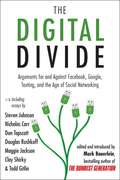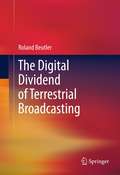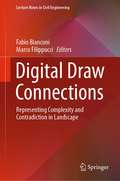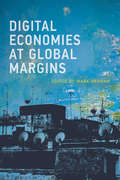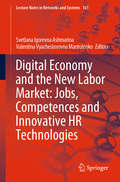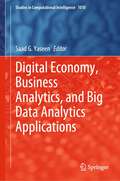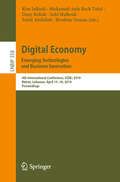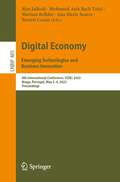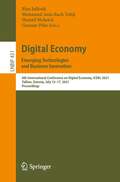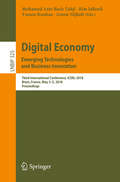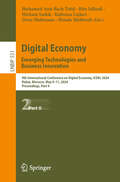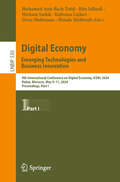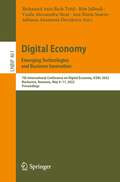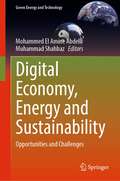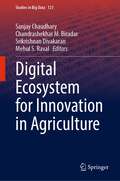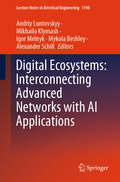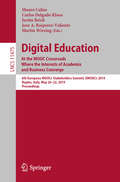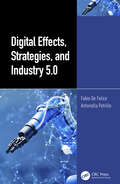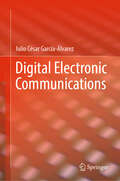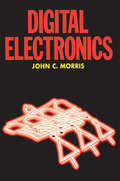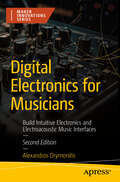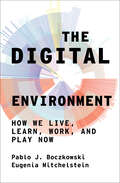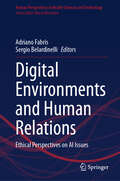- Table View
- List View
The Digital Difference
by W. Russell NeumanW. Russell Neuman examines how the transition from the industrial-era media of one-way publishing and broadcasting to the two-way digital era of online search and social media has affected the dynamics of public life. The issues range from propaganda studies and Big Brother to information overload and Internet network neutrality.
The Digital Divide
by Mark BauerleinThis definitive work on the perils and promise of the social-media revolution collects writings by today's best thinkers and cultural commentators, with an all-new introduction by Bauerlein. Twitter, Facebook, e-publishing, blogs, distance-learning and other social media raise some of the most divisive cultural questions of our time. Some see the technological breakthroughs we live with as hopeful and democratic new steps in education, information gathering, and human progress. But others are deeply concerned by the eroding of civility online, declining reading habits, withering attention spans, and the treacherous effects of 24/7 peer pressure on our young. With The Dumbest Generation, Mark Bauerlein emerged as the foremost voice against the development of an overwhelming digital social culture. But The Digital Divide doesn't take sides. Framing the discussion so that leading voices from across the spectrum, supporters and detractors alike, have the opportunity to weigh in on the profound issues raised by the new media-from questions of reading skills and attention span, to cyber-bullying and the digital playground- Bauerlein's new book takes the debate to a higher ground. The book includes essays by Steven Johnson, Nicholas Carr, Don Tapscott, Douglas Rushkoff, Maggie Jackson, Clay Shirky, Todd Gitlin, and many more. Though these pieces have been previously published, the organization of The Digital Dividegives them freshness and new relevancy, making them part of a single document readers can use to truly get a handle on online privacy, the perils of a plugged-in childhood, and other technology-related hot topics. Rather than dividing the book into "pro" and "con" sections, the essays are arranged by subject-"The Brain, the Senses," "Learning in and out of the Classroom," "Social and Personal Life," "The Millennials," "The Fate of Culture," and "The Human (and Political) Impact." Bauerlein incorporates a short headnote and a capsule bio about each contributor, as well as relevant contextual information about the source of the selection. Bauerlein also provides a new introduction that traces the development of the debate, from the initial Digital Age zeal, to a wave of skepticism, and to a third stage of reflection that wavers between criticism and endorsement. Enthusiasms for the Digital Age has cooled with the passage of time and the piling up of real-life examples that prove the risks of an online-focused culture. However, there is still much debate, comprising thousands of commentaries and hundreds of books, about how these technologies are rewriting our futures. Now, with this timely and definitive volume, readers can finally cut through the clamor, read the the very best writings from each side of The Digital Divide, and make more informed decisions about the presence and place of technology in their lives.
The Digital Dividend of Terrestrial Broadcasting
by Roland BeutlerThe "digital revolution" of the last two decades has pervaded innumerable aspects of our daily lives and changed our planet irreversibly. The shift from analog to digital broadcasting has facilitated a seemingly infinite variety of new applications--audience interactivity being but one example. The greater efficiency and compression of digital media have endowed broadcasters with a "digital dividend" of spare transmission capacity over and above the requirements of terrestrial broadcasting. The question is, who will use it, and how? Comparing the European experience with that of broadcasters elsewhere in the world, the author sketches the current status of international frequency management, quantifies the value of the "dividend" itself, analyzes the details of the analog-to-digital switchovers already completed, and posits what the future holds for the sector. As we grapple with new devices, inconceivable a mere generation ago, that allow us to access digital media instantly, anywhere and at any time of day, this book is a potent reminder that what we have witnessed so far may be just the first wavering steps along a road whose destination we can only guess at.
Digital Draw Connections: Representing Complexity and Contradiction in Landscape (Lecture Notes in Civil Engineering #107)
by Fabio Bianconi Marco FilippucciThis book stems from the seminal work of Robert Venturi and aims at re-projecting it in the current cultural debate by extending it to the scale of landscape and placing it in connection with representative issues. It brings out the transdisciplinary synthesis of a necessarily interdisciplinary approach to the theme, aimed at creating new models which are able to represent the complexity of a contradictory reality and to redefine the centrality of human dimension. As such, the volume gathers multiple experiences developed in different geographical areas, which come into connection with the role of representation. Composed of 43 chapters written by 81 authors from around the world, with an introduction by Jim Venturi and Cezar Nicolescu, the volume is divided into two parts, the first one more theoretical and the other one which showcases real-world applications, although there is never a total split between criticism and operational experimentation of research.
Digital Economies at Global Margins (International Development Research Centre)
by Mark GrahamInvestigations of what increasing digital connectivity and the digitalization of the economy mean for people and places at the world's economic margins.Within the last decade, more than one billion people became new Internet users. Once, digital connectivity was confined to economically prosperous parts of the world; now Internet users make up a majority of the world's population. In this book, contributors from a range of disciplines and locations investigate the impact of increased digital connectivity on people and places at the world's economic margins. Does the advent of a digitalized economy mean that those in economic peripheries can transcend spatial, organizational, social, and political constraints—or do digital tools and techniques tend to reinforce existing inequalities?The contributors present a diverse set of case studies, reporting on digitalization in countries ranging from Chile to Kenya to the Philippines, and develop a broad range of theoretical positions. They consider, among other things, data-driven disintermediation, women's economic empowerment and gendered power relations, digital humanitarianism and philanthropic capitalism, the spread of innovation hubs, and two cases of the reversal of core and periphery in digital innovation.ContributorsNiels Beerepoot, Ryan Burns, Jenna Burrell, Julie Yujie Chen, Peter Dannenberg, Uwe Deichmann, Jonathan Donner, Christopher Foster, Mark Graham, Nicolas Friederici, Hernan Galperin, Catrihel Greppi, Anita Gurumurthy, Isis Hjorth, Lilly Irani, Molly Jackman, Calestous Juma, Dorothea Kleine, Madlen Krone, Vili Lehdonvirta, Chris Locke, Silvia Masiero, Hannah McCarrick,Deepak K. Mishra, Bitange Ndemo, Jorien Oprins, Elisa Oreglia, Stefan Ouma, Robert Pepper, Jack Linchuan Qiu, Julian Stenmanns, Tim Unwin, Julia Verne, Timothy Waema
Digital Economy and the New Labor Market: Jobs, Competences and Innovative HR Technologies (Lecture Notes in Networks and Systems #161)
by Svetlana Igorevna Ashmarina Valentina Vyacheslavovna MantulenkoThis proceedings book contains papers presented at the XI International Online Forum named after A.Ya. Kibanov “Innovative Personnel Management,”, which took place in Moscow, Russian Federation, 15th April–5th May 2020. Organized by Moscow State University of Management, the Forum chiefly focused on HR management issues under conditions of active penetration of IT into the management and economic sphere. The authors of contributions included in this book examine both the theoretical basis for the development of the labor landscape in our digital future, and specific practical issues related to the real business practice. The book includes results of multidisciplinary studies on the following issues: employment and the labor market: a future perspective; current trends of HR management development in digital conditions; IT for creating healthy work conditions; digital transformation and new architecture of the labor market; innovative, strategic HR management and HR analytics; leadership, etc. The book consists of six parts corresponding to thematic areas of the Forum. The first part deals with the transformation of the labor market under the influence of digitalization and international economic relations. The second part is devoted to the analysis of the current changes in the HR management caused by digitalization, as well as issues of creating a healthy work environment and managing well-being with information technology. New architecture of the labor market is considered in the third part of the book in the face of the global uncertainty and the application of digital technology in entrepreneurial activities. The fourth part investigates innovative approaches to the personnel development: from resource management to capacity management. The fifth part presents strategic HR management and HR analytics in the context of current macro-calls. And finally, the sixth part is aimed at considering leadership aspects and relations between investments in the human capital and needed business results. This book is a combination of different scientific opinions and research works of scholars from different countries and regions, offering us a colorful picture of the future labor landscape: jobs, competences and skills that will be in demand.
Digital Economy, Business Analytics, and Big Data Analytics Applications (Studies in Computational Intelligence #1010)
by Saad G. YaseenThis book is about turning data into smart decisions, knowledge into wisdom and business into business intelligence and insight. It explores diverse paradigms, methodologies, models, tools and techniques of the emerging knowledge domain of digitalized business analytics applications.The book covers almost every crucial aspect of applied artificial intelligence in business, smart mobile and digital services in business administration, marketing, accounting, logistics, finance and IT management.This book aids researchers, practitioners and decisions makers to gain enough knowledge and insight on how to effectively leverage data into competitive intelligence.
Digital Economy. Emerging Technologies and Business Innovation: 4th International Conference, ICDEc 2019, Beirut, Lebanon, April 15–18, 2019, Proceedings (Lecture Notes in Business Information Processing #358)
by Rim Jallouli Mohamed Anis Bach Tobji Deny Bélisle Sehl Mellouli Farid Abdallah Ibrahim OsmanThis book constitutes the refereed proceedings of the 4th International Conference on Digital Economy, ICDEc 2019, held in Beirut, Lebanon, in April 2019. The conference was founded in 2016 to discuss innovative research and projects related to the support role of Information System Technologies in the digital transformation process, business innovation and e-commerce. The 31 papers presented in this volume were carefully reviewed and selected from 89 submissions. The theme of ICDEc 2019 was “Digital Economy: Emerging Technologies and Business Innovation”. The papers were organized in topical sections named: digital transformation; e-finance; social media communication; intelligent systems; e-commerce and business analytics; e-learning and cloud education; e-commerce and digital economy; data science; digital marketing; and digital business model.
Digital Economy. Emerging Technologies and Business Innovation: 8th International Conference, ICDEc 2023, Braga, Portugal, May 2–4, 2023, Proceedings (Lecture Notes in Business Information Processing #485)
by Rim Jallouli Mohamed Anis Bach Tobji Meriam Belkhir Ana Maria Soares Beatriz CasaisThis book constitutes the proceedings of the 8th International Conference on Digital Economy, ICDEc 2023, which took place in Braga, Portugal, in May 2023.The 26 full papers included in this volume were carefully reviewed and selected from 72 submissions. They were organized in topical sections as follows: Digital transformation; e-learning and digital competencies; digital marketing and artificial intelligence; e-finance and digital assets; digital marketing and data analytics; digital economy; online session.
Digital Economy. Emerging Technologies and Business Innovation: 6th International Conference on Digital Economy, ICDEc 2021, Tallinn, Estonia, July 15–17, 2021, Proceedings (Lecture Notes in Business Information Processing #431)
by Rim Jallouli Mohamed Anis Bach Tobji Hamid Mcheick Gunnar PihoThis book constitutes the proceedings of the 6th International Conference on Digital Economy, ICDEc 2021. The conference was held during July 15-17, 2021. It was initially planned to take place in Tallin, Estonia, but changed to a virtual event due to the COVID-19 pandemic.The 18 papers presented in this volume were carefully reviewed and selected from 51 submissions. They were organized in topical sections as follows: Digital strategies; virtual communities; digital assets and blockchain technology; artificial intelligence and data science; online education; digital transformation; and augmented reality and IOT.
Digital Economy. Emerging Technologies and Business Innovation: Third International Conference, ICDEc 2018, Brest, France, May 3-5, 2018, Proceedings (Lecture Notes in Business Information Processing #325)
by Mohamed Anis Bach Tobji Rim Jallouli Yamen Koubaa Anton NijholtThis book constitutes the refereed proceedings of the Third International Conference on Digital Economy, ICDEc 2018, held in Brest, France in May 2018. The conference was founded in 2016 to discuss innovative research and projects related to the support role of Information System Technologies in the digital transformation process, business innovation and e-commerce. The 15 papers presented in this volume were carefully reviewed and selected from 41 submissions. The theme of ICDEc 2018 was “Digital Economy: Emerging Technologies and Business Innovation”. The papers were organized in topical sections named: digital marketing; e-banking and competitive intelligence; information system technologies; and e-learning, e-government and e-health.
Digital Economy. Emerging Technologies and Business Innovation: 9th International Conference on Digital Economy, ICDEc 2024, Rabat, Morocco, May 9–11, 2024, Proceedings, Part II (Lecture Notes in Business Information Processing #531)
by Mohamed Anis Bach Tobji Rim Jallouli Hicham Sadok Kaltoum Lajfari Driss Mafamane Houda MahboubThis book constitutes the proceedings of the 9th International Conference on Digital Economy, ICDEc 2024, held in Rabat, Morocco, during May 9-11, 2024. The 43 full papers were carefully reviewed and selected from 117 submissions. They were categorized under the topical sections as follows: Part I: Digital Transformation, Digital Economy and Investment, Artificial Intelligence and E-learning, E-commerce and Social Media Marketing, Exploring the Nexus of Digital and Sustainable Economies in Developing States and Digital Business Models. Part II: Application of Machine Learning for Business, Digital Technologies and Innovative Management, Social Networks and Information Technologies, Digital Economy in Emerging Countries Mobile Banking and Digital Assets, Online Session.
Digital Economy. Emerging Technologies and Business Innovation: 9th International Conference on Digital Economy, ICDEc 2024, Rabat, Morocco, May 9–11, 2024, Proceedings, Part I (Lecture Notes in Business Information Processing #530)
by Mohamed Anis Bach Tobji Rim Jallouli Hicham Sadok Kaltoum Lajfari Driss Mafamane Houda MahboubThis book constitutes the proceedings of the 9th International Conference on Digital Economy, ICDEc 2024, held in Rabat, Morocco, during May 9-11, 2024. The 43 full papers were carefully reviewed and selected from 117 submissions. They were categorized under the topical sections as follows: Part I: Digital Transformation, Digital Economy and Investment, Artificial Intelligence and E-learning, E-commerce and Social Media Marketing, Exploring the Nexus of Digital and Sustainable Economies in Developing States and Digital Business Models. Part II: Application of Machine Learning for Business, Digital Technologies and Innovative Management, Social Networks and Information Technologies, Digital Economy in Emerging Countries Mobile Banking and Digital Assets, Online Session.
Digital Economy. Emerging Technologies and Business Innovation: 7th International Conference on Digital Economy, ICDEc 2022, Bucharest, Romania, May 9–11, 2022, Proceedings (Lecture Notes in Business Information Processing #461)
by Mohamed Anis Bach Tobji Rim Jallouli Vasile Alecsandru Strat Ana Maria Soares Adriana Anamaria DavidescuThis book constitutes the proceedings of the 7th International Conference on Digital Economy, ICDEc 2022, which took place in Bucharest, Romania, in May 2022. The 15 full papers included in this volume were carefully reviewed and selected from 44 submissions. They were organized in topical sections as follows: Digitalization and COVID 19; digital business models for education and healthcare; IT user behavior and satisfaction; digital marketing; and digital transformation.
Digital Economy, Energy and Sustainability: Opportunities and Challenges (Green Energy and Technology)
by Mohammed El Amine Abdelli Muhammad ShahbazThis book looks at how digital economy can help energy businesses to meet their sustainability goals. It will further generates a new debate among policymakers about encouraging green technologies to reduce global carbon emissions.Our modern society requires a long-term, sustainable, and secure energy supply that not only generates and preserves renewable energy. It is also creating universal intelligent machines for power systems, and vital infrastructure is considered in terms of digital economy requirements. The idea of sharing information is an essential principle of sustainable thinking. In such instances, open internet and data access are required to enable any human being to acquire knowledge. Furthermore, the energy industry is changing worldwide, necessitating the consideration of potential implications and modifications. Thus, its most distinguishing feature is moving from a centrally organized system to one with many market players. Consequently, information and communication technologies and human growth have significant main and interactive effects on environmental sustainability. Simultaneously, energy industry is a major player in resolving the digital economy’s development issues.
Digital Ecosystem for Innovation in Agriculture (Studies in Big Data #121)
by Sanjay Chaudhary Chandrashekhar M. Biradar Srikrishnan Divakaran Mehul S. RavalThis book presents the latest findings in the areas of digital ecosystem for innovation in agriculture. The book is organized into two sections with thirteen chapters dealing with specialized areas. It provides the reader with an overview of the frameworks and technologies involved in the digitalization of agriculture, as well as the data processing methods, decision-making processes, and innovative services/applications for enabling digital transformations in agriculture. The chapters are written by experts sharing their experiences in lucid language through case studies, suitable illustrations, and tables. The contents have been designed to fulfill the needs of geospatial, data science, agricultural, and environmental sciences of universities, agricultural universities, technological universities, research institutes, and academic colleges worldwide. It helps the planners, policymakers, and extension scientists plan and sustainably manage agriculture and natural resources.
Digital Ecosystems: Interconnecting Advanced Networks with AI Applications (Lecture Notes in Electrical Engineering #1198)
by Andriy Luntovskyy Alexander Schill Mikhailo Klymash Mykola Beshley Igor MelnykThis book covers several cutting-edge topics and provides a direct follow-up to former publications such as “Intent-based Networking” and “Emerging Networking”, bringing together the latest network technologies and advanced AI applications. Typical subjects include 5G/6G, clouds, fog, leading-edge LLMs, large-scale distributed environments with specific QoS requirements for IoT, robots, machine and deep learning, chatbots, and further AI solutions. The highly promising combination of smart applications, network infrastructure, and AI represents a unique mix of real synergy. Special aspects of current importance such as energy efficiency, reliability, sustainability, security and privacy, telemedicine, e-learning, and image recognition are addressed too. The book is suitable for students, professors, and advanced lecturers for networking, system architecture, and applied AI. Moreover, it serves as a basis for research and inspiration for interested professionals looking for new challenges.
Digital Education: 6th European MOOCs Stakeholders Summit, EMOOCs 2019, Naples, Italy, May 20–22, 2019, Proceedings (Lecture Notes in Computer Science #11475)
by Mauro Calise Carlos Delgado Kloos Justin Reich Jose A. Ruiperez-Valiente Martin WirsingThis book constitutes the proceedings of the 6th European Conference on Massive Open Online Courses, EMOOCs 2019, held in Naples, Italy, in May 2019. The 15 full and 6 short papers presented in this volume were carefully reviewed and selected from 42 submissions. Massive Open Online Courses (MOOCs) have marked a milestone in the use of technology for education. The reach, potential, and possibilities of EMOOCs are immense. But they are not only restricted to global outreach: the same technology can be used to improve teaching on campus and training inside companies and institutions. The chapter 'Goal Setting and Striving in MOOCs. A Peek inside the Black Box of Learner Behaviour' is open access under a CC BY 4.0 license at link.springer.com.
Digital Effects, Strategies, and Industry 5.0 ("International Perspectives on Science, Culture and Society")
by Fabio De Felice Antonella PetrilloThis book discusses the increase in global competitiveness which challenges the manufacturing market to integrate design and product in order to improve quality and process. The book goes on to examine digital manufacturing technologies and critiques how they are transforming every link of the manufacturing value chain.Digital Effects, Strategies, and Industry 5.0 presents many different tooling processes that digital manufacturing utilizes such as artificial intelligence, automation and robotics, additive technology, human-machine interaction, and IoT. Digital manufacturing technologies and how they can transform every link of the manufacturing value chain, from research and development, supply chain, and factory operations to marketing, sales, and service, are examined within the book. Also included is coverage of Industry 5.0, the future, and how it is already starting a trend of change processes directed towards closer cooperation between man and machine, as well as systematic prevention of waste and wasting including industrial upcycling, along with case studies.This book is aimed at professionals and students in the areas of manufacturing and processing, productivity improvement, environmental, engineering management, and information management.
Digital Electronic Communications
by Julio César García-ÁlvarezThis book provides the basic concepts of electronic digital communication, applied to professional practice in communications engineering. The book begins with basic concepts of information theory and explains the need for digital communications, continuing with the basic schemes of digital communication prior to multiplexing, which applies to current digital communication networks, such as LTE, 5G and 6G. The book is intended for researchers, professionals, and second-year students of electrical engineering, electronics or telecommunications. It can also be useful to students in computer science, engineering physics or other disciplines who develop projects involving electronic communication systems.
Digital Electronics
by John MorrisAn essential companion to John C Morris's 'Analogue Electronics', this clear and accessible text is designed for electronics students, teachers and enthusiasts who already have a basic understanding of electronics, and who wish to develop their knowledge of digital techniques and applications. Employing a discovery-based approach, the author covers fundamental theory before going on to develop an appreciation of logic networks, integrated circuit applications and analogue-digital conversion. A section on digital fault finding and useful ic data sheets completes the book.
Digital Electronics for Musicians: Build Intuitive Electronics and Electroacoustic Music Interfaces (Maker Innovations Series)
by Alexandros DrymonitisDive into the world of computer music and physical computing and stay ahead of the melodic curve. This book is aimed at adventurous musicians who want to learn about music programming with Arduino, sensors, and Pure Data, and how to make new interfaces and instruments with that knowledge. In this updated version, you can expect a wave of updates that bring the content in sync with the latest tech trends. The book now features revamped code and visuals throughout, all tailored to match the cutting-edge versions of Pure Data, Arduino IDE, and the powerful Raspberry Pi 5. What's even more thrilling is the integration of the Bela platform for audio enthusiasts, alongside an expanded wireless toolkit that includes both Wi-Fi and the trusty XBee. To ensure a smoother journey, there are more project-enhancing images to guide you, and a brand-new chapter dedicated to AI, based on the author's innovative neuralnet object for Pure Data, as showcased in the AIMC conference proceedings. You’ll start with the basics of the Pure Data and Arduino languages, how to incorporate sensors into your musical projects, and how to use embedded computers, like the Raspberry Pi, to create stand-alone projects. Along the way, you’ll learn how to create a variety of innovative musical projects, including an interactive glove that can be used bystringed instrumentalists or other musicians, an interactive drum set, a patch-bay matrix synthesizer, a guitar looper, a DIY theremin, and even DIY instruments that incorporate AI. If you are a musician or tinkerer who wants to explore the world of electronic and electroacoustic music, then Digital Electronics for Musicians, Second Edition is the book for you. What You Will Learn Incorporate sensors into your musical projects. Combine Arduino and Pure Data to bring the physical world to computers. Use additional libraries that extend the capabilities of the Arduino. Work with external objects in Pure Data and create your own patches from scratch. Write your own sketches with Arduino. Who This Book Is For Musicians who want to explore the world of electronic and electroacoustic music.
The Digital Enterprise
by Kay HenningFirst published in 1999, The Digital Enterprise gives the historical context which gave rise to the digital industry, assesses the key sectors of the industry and outlines new business opportunities in the media, the entertainments business and the retail sector. It describes the challenges to business and how these can be met, and also looks to the digital future.
The Digital Environment: How We Live, Learn, Work, and Play Now
by Pablo J. Boczkowski Eugenia MitchelsteinUnderstanding digital technology in daily life: why we should think holistically in terms of a digital environment instead of discrete devices and apps.Increasingly we live through our personal screens; we work, play, socialize, and learn digitally. The shift to remote everything during the pandemic was another step in a decades-long march toward the digitization of everyday life made possible by innovations in media, information, and communication technology. In The Digital Environment, Pablo Boczkowski and Eugenia Mitchelstein offer a new way to understand the role of the digital in our daily lives, calling on us to turn our attention from our discrete devices and apps to the array of artifacts and practices that make up the digital environment that envelops every aspect of our social experience. Boczkowski and Mitchelstein explore a series of issues raised by the digital takeover of everyday life, drawing on interviews with a variety of experts. They show how existing inequities of gender, race, ethnicity, education, and class are baked into the design and deployment of technology, and describe emancipatory practices that counter this--including the use of Twitter as a platform for activism through such hashtags as #BlackLivesMatter and #MeToo. They discuss the digitization of parenting, schooling, and dating--noting, among other things, that today we can both begin and end relationships online. They describe how digital media shape our consumption of sports, entertainment, and news, and consider the dynamics of political campaigns, disinformation, and social activism. Finally, they report on developments in three areas that will be key to our digital future: data science, virtual reality, and space exploration.
Digital Environments and Human Relations: Ethical Perspectives on AI Issues (Human Perspectives in Health Sciences and Technology #150)
by Adriano Fabris Sergio BelardinelliIn Digital Environments and Human Ecology: New Perspectives on AI Issues, editors and contributors embark on a multidisciplinary exploration of how artificial intelligence (AI) is reshaping the landscapes of human interactions, societal structures, and individual and collective psychologies. Discussing if and to what extent the digital environment can be considered an extension of our environment, this book investigates the profound implications of AI's integration into our daily life, emphasizing the need for a harmonious coexistence between technological advancements and human-centric values, stressing the importance of sustainability in digital development and, therefore, a renewed Human Ecology. By weaving together insights from computer science, social sciences, philosophy, and environmental studies, this book offers a comprehensive and nuanced understanding of the complex relationship between humans and technology. It serves as a vital resource for policymakers, technologists, scholars, and anyone interested in the ethical and ecological implications of digital technologies in our lives.

